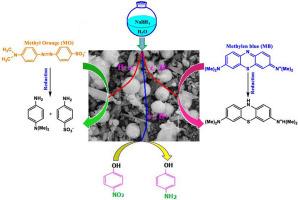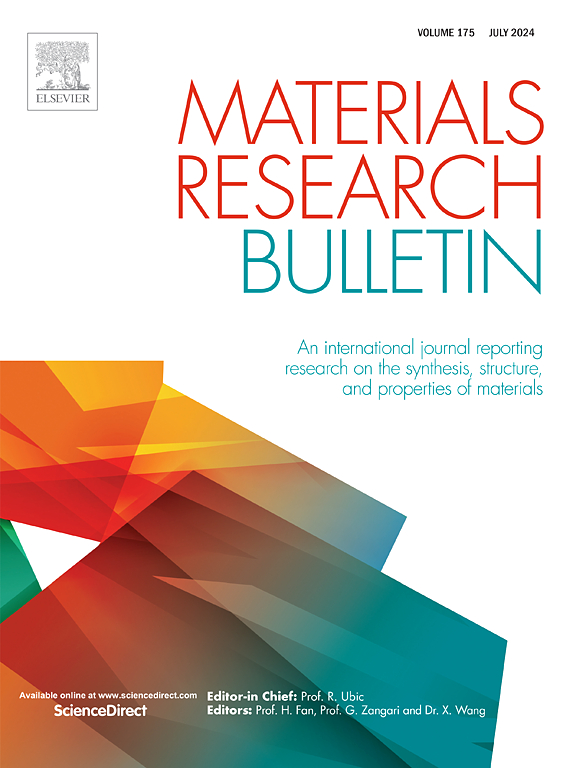Magnetically separable Bi2O2CO3/MIL-101(Fe)/CoFe2O4 nanostructured catalysts for heterogeneous reductive remediation of nitrophenols and organic dyes
IF 5.3
3区 材料科学
Q2 MATERIALS SCIENCE, MULTIDISCIPLINARY
引用次数: 0
Abstract
A new magnetically separable nanocomposite, Bi2O2CO3/MIL-101(Fe)/CoFe2O4, was successfully synthesized through a hydrothermal method. The composite was characterized through various analytical techniques. The nanocomposite demonstrated good catalytic efficiency in reducing nitroaromatic compounds and organic dyes by using NaBH4 reducing agent in aqueous solutions at room temperature. The apparent rate constant (kapp) values for 4-nitrophenol, 2-nitrophenol, 2-nitroaniline, and 4-nitroaniline were recorded at 0.457, 0.253, 1.52, and 0.564 min⁻¹, respectively, achieving complete conversion in just 2 to 9 min. Under similar conditions, methylene blue, methyl orange, rhodamine B, congo red, and crystal violet organic dyes were reduced to 98–100 % within 4 to 20 min, with kapp values ranging from 0.157 to 0.885 min⁻¹. Furthermore, the influence of catalyst dosage, NaBH4 concentration, and substrate concentration on the reduction process was examined. Importantly, the nanocomposite can be recovered using an external magnet and reused over four consecutive cycles without a significant reduction in catalytic efficiency.

磁性可分离 Bi2O2CO3/MIL-101(Fe)/CoFe2O4 纳米结构催化剂用于硝基苯酚和有机染料的异相还原修复
通过水热法成功合成了一种新型磁分离纳米复合材料--Bi2O2CO3/MIL-101(Fe)/CoFe2O4。通过各种分析技术对该复合材料进行了表征。使用 NaBH4 还原剂在室温水溶液中还原硝基芳香族化合物和有机染料时,该纳米复合材料表现出良好的催化效率。4-硝基苯酚、2-硝基苯酚、2-硝基苯胺和 4-硝基苯胺的表观速率常数(kapp)分别为 0.457、0.253、1.52 和 0.564 min-¹,仅需 2 至 9 分钟即可实现完全转化。在类似条件下,亚甲基蓝、甲基橙、罗丹明 B、刚果红和结晶紫有机染料在 4 至 20 分钟内被还原到 98-100 %,kapp 值在 0.157 至 0.885 min-¹ 之间。此外,还考察了催化剂用量、NaBH4 浓度和底物浓度对还原过程的影响。重要的是,该纳米复合材料可使用外部磁铁回收,并可连续重复使用四个周期,而催化效率不会显著降低。
本文章由计算机程序翻译,如有差异,请以英文原文为准。
求助全文
约1分钟内获得全文
求助全文
来源期刊

Materials Research Bulletin
工程技术-材料科学:综合
CiteScore
9.80
自引率
5.60%
发文量
372
审稿时长
42 days
期刊介绍:
Materials Research Bulletin is an international journal reporting high-impact research on processing-structure-property relationships in functional materials and nanomaterials with interesting electronic, magnetic, optical, thermal, mechanical or catalytic properties. Papers purely on thermodynamics or theoretical calculations (e.g., density functional theory) do not fall within the scope of the journal unless they also demonstrate a clear link to physical properties. Topics covered include functional materials (e.g., dielectrics, pyroelectrics, piezoelectrics, ferroelectrics, relaxors, thermoelectrics, etc.); electrochemistry and solid-state ionics (e.g., photovoltaics, batteries, sensors, and fuel cells); nanomaterials, graphene, and nanocomposites; luminescence and photocatalysis; crystal-structure and defect-structure analysis; novel electronics; non-crystalline solids; flexible electronics; protein-material interactions; and polymeric ion-exchange membranes.
 求助内容:
求助内容: 应助结果提醒方式:
应助结果提醒方式:


